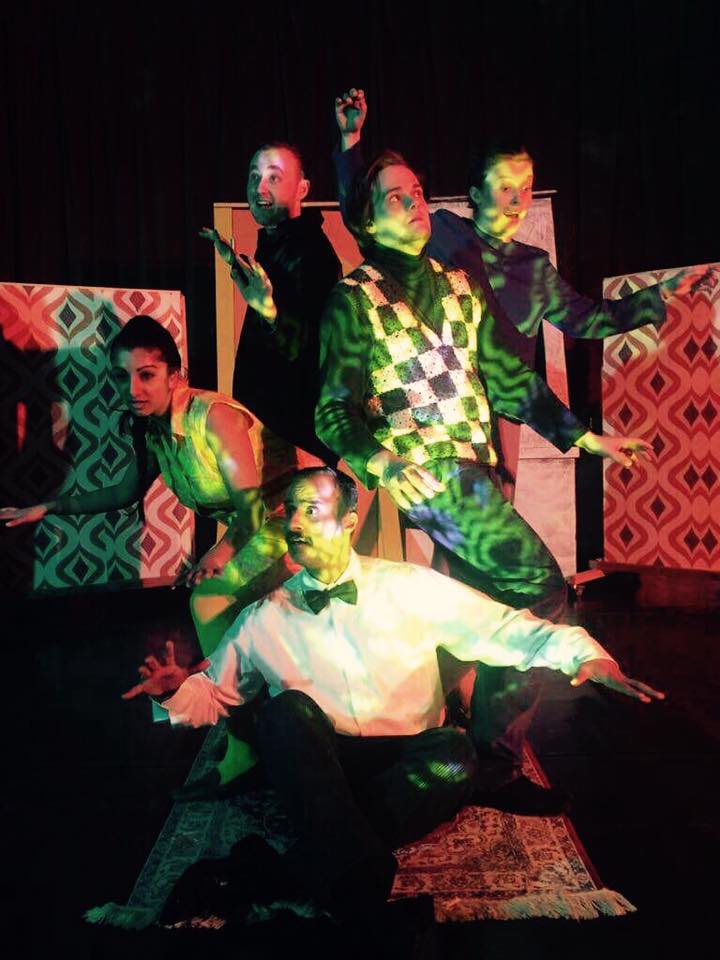|
Kent's Balti Celtic
Rupert White on 'The Incredible
Balti Celtic Carpet Ride' by Alan M. Kent.
"Today, after more than a century of
electric technology, we have extended our central nervous system in a
global embrace, abolishing both space and time as far as our planet is
concerned".
Marshall McLuhan's 'Global Village' - neatly summed up in this quote
from his book 'Understanding Media' (1964) - has been criticised for its
one-sided optimism and naiveté. However, when the term first appeared in
the early 1960's, the use of the 'village' metaphor to describe a
condensed, or contracted, world moving away from the written word, but
ever more tightly connected by electronic communications, was clearly
attractive.
Alan M. Kent, whose writing over many years has been consistently
centred on ideas of Cornwall and Cornish identity, has chosen to set his
most recent play, 'The Incredible Balti Celtic Carpet Ride' three years
after McLuhan's book, in the Cornwall of the 'Summer of Love'. At the
time, The Beatles, because of their international popularity were riding
the wave of globalisation that, as McLuhan had described, was occurring
in this post-colonial period. They were yet to visit their ashram in
India (that was the following year - 1968), but they were already in
full psychedelic mode, and in the late summer, travelled down in a
bus to Newquay to shoot footage for their strange, surreal excursion:
'Magical Mystery Tour', a largely improvised film that includes the
frankly absurd 'I am the Walrus'.

Fizz, one of the central
characters in Kent's lively play, is an aspiring beatnik musician living
in Newquay, and in an early scene we see him visiting the celebrated
Folk Cottage folk club in nearby Mitchell with his girlfriend Bindu.
Bindu is the attractive teenage daughter of Sandeep, an Indian immigrant
and proud owner of the first Balti house in Cornwall. His restaurant,
with its large sculpture of Ganesh, is the central location in the play,
and the fact of its existence the premise for subtle, and not so subtle,
discussions about culture and identity.
Here Alan Kent's voice as a
hybridising postmodern playwright comes through strongly, with
references to D.H. Lawrence and Rabindranath Tagore mixed up with
light-hearted nods towards 70s sitcoms like 'Mind Your Language'. It's
novel and refreshing to see these themes revisited in the context of
twentieth century Cornwall and familiar racial stereotypes are given a
few surprising, and heart-warming, twists. Cornwall is not usually
thought of as a place of cultural diversity, and it can be argued that,
as a consequence, Cornish identity has become entrenched and stultified,
and even more prone to caricature than Indian. Monotonously fixed in 'Poldark-time',
with its tin-mines and period costumes, more nuanced and
diverse representations that situate Cornwall in a bigger, post-modern
'global village' are very welcome, and long overdue.
In a way the characters in 'Balti Celtic Carpet Ride' precisely enact
McLuhan's rose-tinted vision: with the Indians and the Cornish of both
generations initially brought together - against the odds - by their
love of The Beatles. Later they all get to meet the Fab Four in Newquay,
before being united in the penultimate scene: the titular carpet ride
itself which (spoiler alert) is actually an LSD trip. During the trip
(pictured above) Sandeep the restaurant owner, bathed in psychedelic
coloured light, leads his new Cornish friends over the countries of the
middle East, and on to India and his home-town of Lucknow, which they
observe in all its glory from the air.
The happy harmony between the Indians and the Cornish does
not last however, and differences emerge a few weeks after they've 'come
down' from the carpet ride, as they sit huddled together watching the
final cut of 'The Magical Mystery Tour' broadcast, as it was, on TV as
part of the BBC Christmas schedules. In a neat twist, the fracture grows
along intergenerational not interracial lines, however, with the older
generation - both Cornish and Indian - disliking the film, albeit for
different reasons.
This merest hint of difference and
alienation is shortlived, and the play ends with the seemingly
inevitable, though tongue-in-cheek, expression of a harmonious
multicultural Cornwall: Sandeep announces his intention to make the best
curry pasty in Western Europe.
9/4/18
Directed by Iga
Drzymkowska, and
featuring Alan Suri, Kara-Dee Rai, Michael Tonkin-Jones, Max Webb and
Bryher Flanders, 'The Incredible Balti Celtic Carpet Ride' tours
Cornwall until the end of April.
http://www.gwaryteg.com/
|

